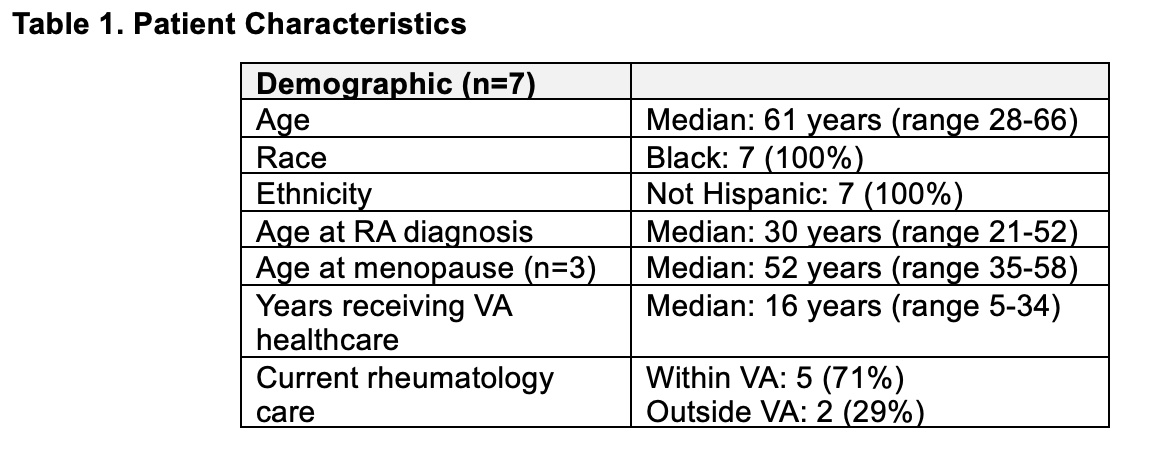Session Information
Date: Tuesday, October 28, 2025
Title: (2195–2226) Reproductive Issues in Rheumatic Disorders Posters
Session Type: Poster Session C
Session Time: 10:30AM-12:30PM
Background/Purpose: There is a significant gap in understanding the reproductive health experiences of women Veterans with rheumatoid arthritis (RA). This study explores their experiences with menopause within the VA healthcare system, including perceptions of rheumatologists’ roles in symptom management and care coordination between rheumatology and other providers.
Methods: Semi-structured interviews with 9 VA healthcare providers (5 rheumatologists, 4 primary care providers) and 7 Veterans with RA explored reproductive healthcare experiences and needs within the VA. All Veterans self-identified as Black and had been evaluated by a rheumatologist for RA. Veterans were identified via the Corporate Data Warehouse. Of the 128 Veterans contacted, 31 consented. Interview guides were developed using the Chronic Care and Cumulative Complexity Models to explore contraception, pregnancy, and menopause. Interviews were audio-recorded and transcribed using Microsoft Teams. Data were analyzed using Hamilton’s rapid qualitative method. Two analysts summarized individual and cross-participant levels, with input from a third analyst. Overall themes were identified through structured matrix analysis.
Results: We interviewed 7 Veterans about experiences with menopause symptoms and therapies, median age 61 years (Table 1). Veterans reported joint pain and swelling that disrupted daily activities related to their RA. Veterans described difficulty with differentiating menopause symptoms from RA and relied on rheumatologists for guidance. They valued discussions with their rheumatologists about menopause and hormone therapy (HT) and its impacts on RA. Veterans drew on clinical advice and personal considerations when making decisions about menopause therapy. Some utilized supportive care, supplements, or HT to address menopausal symptoms. Some Veterans decided against HT due to medication burden or history of thrombosis. VA rheumatologists and PCPs expressed lower confidence in managing menopause compared to other reproductive health concerns and reported a generalized approach, as opposed to a disease-tailored approach, to menopause in Veterans with RA. Both Veterans and providers noted a lack of patient and provider resources for women with autoimmune disease undergoing menopause. Veterans believed that better access to reliable, personalized resources would have enhanced their menopause experience (Figure 1).
Conclusion: These findings highlight the challenges faced by Veterans with RA in managing menopause symptoms, particularly in distinguishing between RA-related and menopause-related symptoms. Veterans valued the involvement of their rheumatologists and want more guidance on menopause and HT, especially in relation to its impact on RA. Both Veterans and VA providers identified a gap in tailored resources and personalized approaches for women with RA undergoing menopause.
 Table 1. Patient Characteristics
Table 1. Patient Characteristics
.jpg) Figure 1. Emergent Themes in Menopause Experiences of Veterans with Rheumatoid Arthritis
Figure 1. Emergent Themes in Menopause Experiences of Veterans with Rheumatoid Arthritis
To cite this abstract in AMA style:
Sims C, Choi Y, Shapiro A, Gierisch J, Strawbridge E, Howard T, Shah A, Goldstein K. Menopause Experiences of Veterans from Minoritized Populations with Rheumatoid Arthritis [abstract]. Arthritis Rheumatol. 2025; 77 (suppl 9). https://acrabstracts.org/abstract/menopause-experiences-of-veterans-from-minoritized-populations-with-rheumatoid-arthritis/. Accessed .« Back to ACR Convergence 2025
ACR Meeting Abstracts - https://acrabstracts.org/abstract/menopause-experiences-of-veterans-from-minoritized-populations-with-rheumatoid-arthritis/
